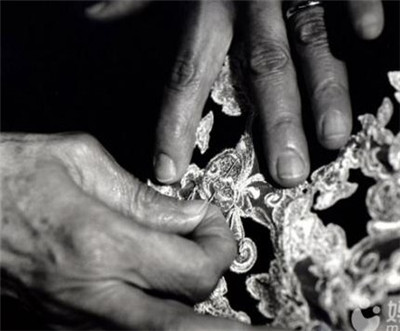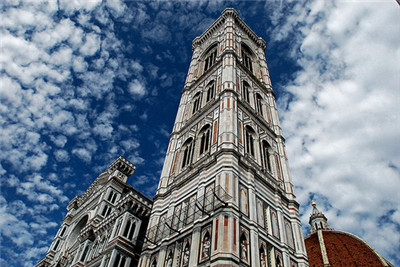(单词翻译:单击)
For the Travel section’s Oct. 19 issue on Europe, writers and editors selected special items to profile from a dozen cities. Below, explore everything from chocolate in Brussels to silk in Florence to design in Copenhagen.
在欧洲版10月19日旅游板块,作者与编辑精选了十二个城市的独特珍宝,下面,我们从布鲁塞尔的巧克力、佛罗伦萨的丝绸到哥本哈根的设计,逐一欣赏吧。

Florence: Silk
佛罗伦萨的丝绸
Down a quiet lane in the San Frediano district of Florence, beyond an iron gate and leafy courtyard, is Antico Setificio Fiorentino, the sole remaining artisan silk workshop in the city. Since moving to this location (Via Lorenzo Bartolini 4) in 1786, the small factory has maintained uninterrupted production, despite wars and floods. The art of silk-making in Florence flourished in the Renaissance, when noble families amassed fortunes and fame by producing exquisite silks. That tradition endures at Antico Setificio Fiorentino, where silks are woven by hand on antique looms using Renaissance patterns.
沿着佛罗伦萨圣弗雷迪亚诺一条寂静的小巷走下去,走过一道铁门和树影婆娑的庭院,就是佛罗伦萨古丝绸铺(Antico Setificio Fiorentino),整个城市硕果仅存的一座手工丝绸工作坊。1786年,这座小厂搬到了目前的店址(洛伦佐巴尔托里尼大街4号),从此一直在无休止地生产丝绸,哪怕战争与洪水也不曾让它停工。佛罗伦萨的丝绸制造工艺在文艺复兴时期鼎盛一时,凭借制造精美的丝绸,若干尊贵的家族积累起了财富和声名。凭借这一传统,该店一直持续至今,古董织布机手工织成的丝绸使用的依然是文艺复兴时期的图案。
During a recent tour, the designer Maurizio Bonas rattled off the illustrious names of historic Florentine clans — Corsini, Pucci, Strozzi — whose signature patterns are still being produced. “When you go inside many historical houses in Italy, it’s Antico Setificio that did them,” said Mr. Bonas, who noted that the factory’s silks also adorn rooms in the Vatican, the Palazzo Vecchio and the Tribuna degli Uffizi in Florence, and even in the Kremlin in Moscow.
在最近的一次游览中,设计师莫里芝奥·博纳斯(Maurizio Bonas)如数家珍地说起佛罗伦萨艺术史上那些响当当的名字——科尔西尼(Corsini)、浦西(Pucci)、斯特罗奇(Strozzi),其中斯特罗奇的签名图案仍然在生产。“当你走进意大利很多历史遗址,你们发现是古丝绸铺塑造了它们的美丽。”博纳斯先生说。他强调,该厂的丝绸产品也装饰了梵蒂冈、佛罗伦萨美第奇家族的旧宫、乌菲齐美术馆的讲坛宫,甚至莫斯科的克里姆林宫。

“To make these kinds of fabric, we cannot use the modern machines,” Mr. Bonas said, pulling out a roll of sumptuous blue embroidered silk velvet made with 350,000 stitches per meter. One worker who was weaving a cream-colored damask from a design named for the Renaissance painter Pinturicchio could be expected to complete only 80 to 100 centimeters of the fabric per day. And because the small factory employs only 20 artisans, production is predictably limited — and costly. In the adjoining showroom, walls are lined with bolts of silk, from plush velvets and intricate damasks to diaphanous taffetas, 110 to 1,360 euros (about $135 to $1,670) per meter. Decorative pillows are adorned with hand-woven trims. And, on a table, a basket is filled with sachets made of Ermisino, a shimmering silk taffeta that dates back 500 years. Inside each is potpourri from Officina Profumo-Farmaceutica di Santa Maria Novella, a 400-year-old pharmacy that has partnered with Antico Setificio for, as Mr. Bonas said, “only 250 years.”
“制造这些织物,我们不使用现代机器。”博纳斯说着,拉出一匹华丽的蓝色刺绣丝绸天鹅绒,每米要用35万针才能织成。有一种奶油色的缎子得名于文艺复兴时期的画家平图里乔(Pinturicchio),一名工人一天只能织出80至100厘米。由于这家小厂只雇佣了20名手工艺人,可以想见产量十分有限——也非常贵。隔壁的展览厅内,四壁挂着一匹匹的丝绸,有奢华的天鹅绒、精美的锦缎和娇贵的绉丝,每米售价110欧元至1360欧元(合135美元至1670美元)。装饰枕上缀着手工编织的流苏,一张桌子上摆着个篮子,里面装满了香囊,是用一种名叫艾莫西诺的有五百年历史的闪亮丝绸做成的,售价110至1360欧元(约合135至1670美元)。香囊里装的是圣玛利亚香草药房Officina Profumo-Farmaceutica di Santa Maria Novella)供应的各种香花粉末,这家药房已有400年历史,但博纳斯先生说的,“双方的合作仅有250年。”
A more recent partnership with the Stefano Ricci luxury men’s wear label, which acquired Antico Setificio in 2010, means the designer’s nearby store now stocks wearable wares made with Antico Setificio’s fine silk. INGRID K. WILLIAMS
最近的合作是与豪华男装品牌史蒂芬劳·尼治(Stefano Ricci)。2010年,它收购了古丝绸铺,这意味着附近该品牌店内的领带是用古丝绸铺的精美丝绸制造而成的。英格丽德·威廉姆斯(INGRID K. WILLIAMS)供稿。


